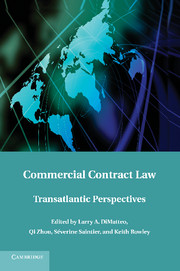Book contents
- Commercial Contract Law
- Commercial Contract Law
- Copyright page
- Dedication
- Brief Contents
- Contents
- Contributors
- Foreword
- Part I The Role of Consent
- 1 Transatlantic Perspectives
- 2 Competing Theories of Contract
- 3 Contracts, Courts, and the Construction of Consent
- 4 Are Mortgage Contracts Promises?
- Part II Normative Views of Contract
- Part III Contract Design and Good Faith
- Part IV Implied Terms and Interpretation
- Part V Policing Contracting Behavior
- Part VI Misrepresentation, Breach, and Remedies
- Part VII Harmonizing Contract Law
- Index
3 - Contracts, Courts, and the Construction of Consent
from Part I - The Role of Consent
Published online by Cambridge University Press: 05 February 2013
- Commercial Contract Law
- Commercial Contract Law
- Copyright page
- Dedication
- Brief Contents
- Contents
- Contributors
- Foreword
- Part I The Role of Consent
- 1 Transatlantic Perspectives
- 2 Competing Theories of Contract
- 3 Contracts, Courts, and the Construction of Consent
- 4 Are Mortgage Contracts Promises?
- Part II Normative Views of Contract
- Part III Contract Design and Good Faith
- Part IV Implied Terms and Interpretation
- Part V Policing Contracting Behavior
- Part VI Misrepresentation, Breach, and Remedies
- Part VII Harmonizing Contract Law
- Index
Summary
Anglo-American contract law sometimes acknowledges that the legal construct of “objective consent” is distinct from actual subjective consent. But contract law also labors to obscure this distinction and conflate the two concepts – indeed, the very term “objective consent” performs this function. Economic analysis of law sometimes engages in a similar conflation by treating the efficiency of an arrangement – as determined by a judge (or an academic theorist) – as a perfect proxy for subjective consent to that arrangement.
Basing contractual obligations on judicial assessments of outward phenomena means contract law depends at least in part on judges’ subjective notions of policy and fairness. Conflating this court-centered process with subjective consent is descriptively inaccurate. It is also faulty normative reasoning, as it invokes simple libertarian rhetoric to justify a more complex, statist process. The conflation problem is especially relevant with respect to form contracts, which fit uneasily with traditional notions of subjective consent. Courts and theorists should avoid the easy invocation of “consent” as the basis of contract law and instead be more specific in disclosing– and defending – the normative assumptions behind their prescriptions.
- Type
- Chapter
- Information
- Commercial Contract LawTransatlantic Perspectives, pp. 41 - 66Publisher: Cambridge University PressPrint publication year: 2013



